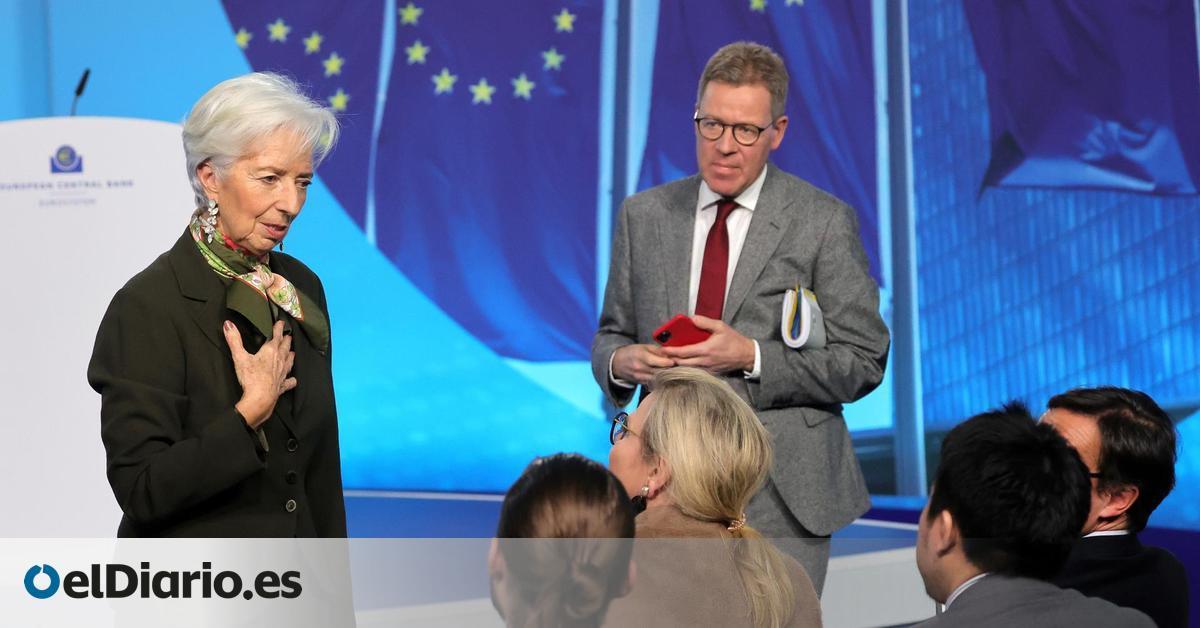
Isabel Schnabel, Germany’s voice on the executive board of the European Central Bank (ECB), has admitted that, to date, “unprecedented monetary policy tightening, aimed at controlling inflation, has had little effect.”
The interests that drown families and the record profit of the bank open the debate on the ceiling on mortgages
Further
“Consumer price growth still has momentum, with core inflation level [excluye la energía del cálculo] extraordinarily high”, lamented Schnabel, in a statement this week, just after the last rise in official interest rates in the euro area by the institution, up to 3%. Although far from proposing alternatives, she and other voices from the institution insist on continuing to increase the ‘price’ of money as the only valid strategy.
“We have to ask ourselves how long we must remain in restrictive territory,” continues the German. “It will depend on whether we have solid evidence that inflation, and especially core inflation, is converging towards our 2% target and stabilizing there,” she concludes. When she talks about restrictive, she means that the increase in the cost of mortgages and loans ends up critically damaging the ability of families to consume and companies to invest.
The ECB’s monetary policy strategy doubles the blow of price increases to households that have or need financing, and to the rest by the damage to economic activity in general. In January, inflation in the euro area fell to 8.5%, according to the general CPI, which in Spain was contained at 5.8%, the lowest in the entire EU and at its lowest since 2021, thanks mainly to the measures of government shock and the fall of energy in international markets. The expectation is that this rate will continue to fall until it is close to 3% in December in the euro ‘club’ as a whole.
Questioned by elDiario.es in a round of questions on Twitter promoted by the ECB, Isabel Schnabel denied this Friday that “general disinflation” had begun. “We need to use all our tools to restore price stability and support sustainable growth. Otherwise, we would see even steeper declines in real wages, and we may need to raise interest rates even more,” she warned.
For his part, this week, in an interview with the Munich newspaper ‘Süddeutsche Zeitung’, Luis de Guindos, current vice president of the ECB, refines more and calculates that “our interest rate policy takes one to two years to take effect ”. And coldly, he points out: “But we are already seeing its initial effects: household borrowing costs [las hipotecas] and companies are increasing, for example, and this is weakening the demand for loans. In turn, that helps cool the economy and leads to lower price increases.”
German journalists pertinently ask Luis de Guindos: “Energy prices have fallen recently. Is the inflation nightmare coming to an end? The response of the former Minister of Economy in Spain with the Popular Party, between 2011 and 2018, is discouraging, in line with Schnabel: “No, we should still be worried about inflation.”
Luis de Guindos admits in his analysis that “there are some favorable trends that are easing the pressure of inflation, including the reduction in energy prices […]. The appreciation of the euro in the currency markets is also contributing [abarata las importaciones de petróleo o gas, denominados en dólares]”. In addition, as he continues, “there are fewer supply shortages related to the pandemic.”
I would not rule out further rate hikes after March
Louis of Gundos
— ECB Vice President
“However, we see that the reopening of the economy in China after [tras las restricciones por la COVID] it is generating increased demand for energy, metals and raw materials. That may favor more price pressures. And wages are also increasing, ”he adds.
Regarding the demand of the workers to recover the historical loss of purchasing power that they are suffering due to the damage caused by inflation, the vice-president of the ECB believes that “the parties [sindicatos y empresas] in the ongoing wage negotiations are recalling the high inflation of last year. But inflation will subside over the course of the year: we expect an average inflation rate of around 6% this year, up from 3.6% in the last quarter. [en el conjunto de la eurozona]. However, unions may be inclined to ask for excessive wage increases. We have to be careful.”
According to OECD calculations this week, the disposable income of Spanish families has shrunk by about 8% from 2019 to the third quarter of last year. “Isn’t that a bit harsh? Low-income households have been especially affected by inflation”, the German journalists slip. But Luis de Guindos shakes the dogma of orthodox monetary policy: “In a spiral of wages and prices, nobody wins.” And he threatens: “If we enter that loop, the ECB will have to raise interest rates more than would have been necessary.”
“The battle against inflation is not over yet,” he continues. After the rise in official interest rates of 0.5 points at the beginning of February, up to 3% for the main reference, the second of Christine Lagarde points out that “it is very likely that we will increase them by another 0.5 percentage points [el ‘precio’ del dinero] at our next meeting in March. Then we’ll see what we’ll do. I would not rule out further rate hikes after March.”
“Is the ECB in danger of going too far?” they question from the ‘Süddeutsche Zeitung’. “Our mandate is to maintain price stability. That’s all. That is the only mandate we have. High inflation harms everyone in society”, Luis de Guindos insists.
In Madrid, Nacho Álvarez, Secretary of State for Social Rights, stressed to the ECB leaders “that rate hikes would not be of much help to curb inflation, that was to be expected: the causes of this inflation are mainly linked to energy costs , not on demand.
“Self-inducing a recession when you’re not even sure it’s going to stop inflation doesn’t seem like a very sensible strategy,” he says. “Making the reduction of inflation compatible with preserving the good progress of the economy and employment is not easy, it is true. Precisely for this reason, inflation –on this occasion, and given its origin– cannot be left exclusively or mainly in the hands of monetary policy”, he stresses.
From an energy crisis to an economic crisis
“The ECB is converting an inflation crisis in the north due to the energy crisis, into an inflation and interest rate crisis throughout the euro area. Especially hard for the most vulnerable families”, denounces Carlos Martín Urriza, director of the CCOO economic cabinet.
“Spain should not pay for the energy model of Germany, which depended on cheap gas from Russia,” continues the CCOO expert. In addition, it stands out that the main economy of the euro area benefits from the restrictive monetary policy because most of its mortgages are at a fixed rate, unlike in our country, and their families are net savers, and they benefit from the higher profitability that They will offer deposits.
On the other hand, José Ramón Díez, an economist at Caixabank Research, observes that “the growth data for the last quarter of 2022 have confirmed the sharp and expected slowdown in world activity caused by the effects of the rise in energy prices and the tightening of monetary policy”.
And his colleague, Oriol Aspachs, explains that “the transfer of the increase in production costs to final prices occurs gradually, so the underlying inflation rate will still remain high this year. But the first step for this process to lose momentum is through the moderation of energy prices”.
And he concludes: “The containment of inflationary pressures throughout the year will also make it easier for the ECB to stop raising interest rates in 2023. The conjunction of these two factors is extremely important so that households can maintain their consumption and to that companies can carry out their investment plans at a time of such relevant economic transformation”.
Is it being useful to raise interest rates to curb inflation?
Isabel Schnabel (ECB Executive Board) acknowledges that these increases are having little impact on prices.
It is urgent to change this strategy in Europe. I open thread 👇 https://t.co/p7NVs7wFu6
– Nacho Álvarez (@nachoalvarez_) February 8, 2023
“We must use other instruments [al margen de la política monetaria del BCE] to correct price increases. It is crucial to act in those markets from where inflationary pressures have been radiating to the economy as a whole. Specifically, acting on the electricity market, on energy costs and on food prices seems more effective. In Spain, this strategy has made it possible to reduce inflation faster than in the EU”, develops Nacho Álvarez.
“In addition, there is still a blind spot in European economic policy: second-round effects originating in corporate profits. In some sectors, profit margins have skyrocketed above cost growth, entrenching inflation”, concludes the economist.
––––––––
Before you stop reading…
elDiario.es is financed by the contributions of 60,000 members who support us. Thanks to them, we can write articles like this one and that all readers – including those who cannot pay – have access to our information. But we ask you to think for a moment about our situation. Unlike other media, we do not shut down our journalism. And that makes it much more difficult for us than for other media to convince readers of the need to pay.
If you get information from elDiario.es and you believe that our journalism is important, and that it is worthwhile for it to exist and reach as many people as possible, support us. Because our work is necessary, and because elDiario.es needs it. Become a member, become a member, of elDiario.es.
Source: www.eldiario.es

